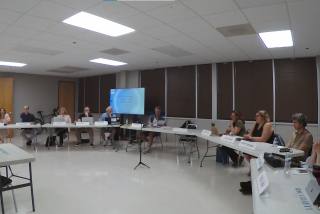What If No One Will Serve on Board?
- Share via
QUESTION: Our 10-unit condominium complex is about 10 years old. I have served on the board and given a lot of my time to the association in the past but I am unable to continue as a board member.
Our annual election is coming up soon and no one has offered to serve. Some people feel that they do not have the skills or the time to be a board member.
Several of the owners are also intimidated by one member who frequently files lawsuits against the association. No one wants to serve with the threat of lawsuits from this unreasonable owner.
The person who is currently handling our assessment billing has asked the board to find someone else to do the job.
What happens when the owners are unwilling to serve on the board? If no one else will volunteer, do the current board members have an obligation to continue to act on behalf of the association?
ANSWER: Lack of owner participation can occur for several reasons: a board member who does such a good job that no one else wants to try to fill his or her shoes, an erosion of respect for the board and the association because of mismanagement, or a board member who continually complains about serving on the board so that no one else wants to take the job.
It seems that few individuals have the volunteer spirit that compels them to serve for the common good. There are many charities, churches and other places where the altruistic person can give his or her time. Often the board’s enforcement role will deter volunteers. Most people do not like to confront their neighbors about rule violations.
So what can we say to persuade people to serve their association? Most people who serve on community association boards say that they do so to protect their investment. It is obvious that a dysfunctional association will cause everyone’s investment to deteriorate, so that is a good way to convince someone to participate.
Of course, unreasonable owners and lawsuits tend to reduce the number of people who are willing to volunteer. An owner who thrives on conflict can be a nightmare for any board.
You would probably like to hang a sign around the difficult owner’s neck that reads, “This person should not live in a condominium” and then kick him out the door. However, that is not possible.
This continuing feud needs to be resolved so that the association can function effectively. The board should listen to the owner’s complaints and see if he has valid reasons for challenging the board’s actions. Perhaps mediation can effectively bring out and resolve the underlying causes of the owner’s dissatisfaction.
To find nominees for the election, the board of directors should write a letter to all of the owners to let everyone know that the association is looking for volunteers to serve on the board. Some people will not volunteer even if they have the skills and the time. The board must put out an urgent appeal and recruit people by knocking on doors and talking face to face with the other owners.
During this search for volunteers, the board will get an earful of excuses and complaints about what’s wrong with the association and the reasons why people don’t want to volunteer. But in the process, the owners will have a chance to express their feelings about the association and they may decide to give some of their time if they find that their opinions and their skills are needed and valued.
If this search for board members is unsuccessful, then it is time to call a meeting of the owners, prior to the election, to discuss the consequences of a dysfunctional association. Talk about ways to reduce the board members’ duties such as hiring a management company or an accounting firm to handle the financial and administrative functions.
If the board fails to function, the owners can file a court petition to have a court-appointed receiver manage the association until an election is held or until the court finds that the association can function properly again.
If I were you, I would stay on the board and urge all of the other board members to continue serving until nominees are found so that a valid election can occur.
Hickenbottom is a past president of the Greater Los Angeles chapter of the Community Associations Institute (CAI), a national nonprofit research and educational organization. She welcomes readers’ questions, but cannot answer them individually. Readers with questions or comments can write to her in care of “Condo Q&A;,” Box 5068, Thousand Oaks, Calif. 91360.


